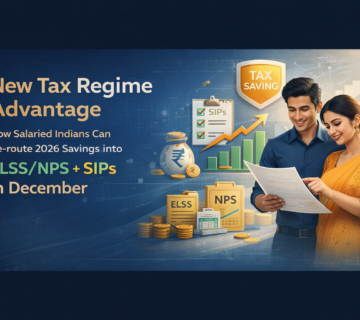Every month it feels like the same battle. You want to buy something you’ve been wanting, or plan a weekend trip. But then a voice in the back of your head whispers, “What about savings?” Suddenly, the joy of spending turns into guilt.
These thoughts have trapped a lot of people into thinking they must live well today or build safety for tomorrow. For many, working with a wealth management company in Gurgaon can help create balance and remove this constant tug-of-war.
What if that choice was never real in the first place?
The Financial Comfort Reality Check
What felt like enough a decade ago won’t even cover the basics today. In 2025, multiple surveys and financial reports point to a single figure: ₹3.5 crore. That’s the net worth or retirement corpus most Indians now need to breathe easy.
This figure reveals something crucial: financial comfort isn’t just about accumulating wealth; it’s about creating a system that provides security both now and later.
Here’s what traditional financial planning gets wrong: they tell you to sacrifice today for tomorrow, or worse, they help you rationalize poor financial decisions that feel good now but destroy your future. That’s why working with a wealth management company in Gurgaon or any trusted advisor is so valuable—it gives structure to both today’s and tomorrow’s goals.
The Wealth Escalator Framework: A Better Way Forward
The most successful individuals do not force themselves to choose between short-term comfort and long-term wealth. But they are the ones who know how to balance these two aspects and have a better present and future.
But if you are unsure of how you can do this, you would need the plan what we call the wealth escalator. It is designed to help you gain the financial freedom. It moves them from financial stress to financial freedom while ensuring comfort at every step.
This approach starts with the foundation and then moves up. Firms like the best retirement planning company in India often apply this same staged method to help clients stay steady.
Stage 1: Foundation Building (Months 1–6)
This stage is like pouring the concrete before constructing a house. This is because, you need a strong base to win.
- Emergency Fund: Aim to save 3–6 months of living expenses. This safety net that can help you during your uncertain times.
- High-Yield Savings Account: Keep your short-term funds here. It grows faster and will help you earn a better return as compared to the rest.
- Long-Term Freedom Setup: Contribute enough so that you have a future savings in place. This can be some pension scheme or anything linked.
- Automation: Set up automatic transfers to savings and investment accounts. This will helps you to ensure your savings move ahead without any delays.
- Simple Investment Account: Beyond retirement savings, open a basic investment account. This will grow and you will have better savings in place.
The key here is patience. Many rush into stocks too early. Having a guide, like a financial planner Gurgaon residents rely on, ensures you don’t miss these essentials.
Stage 2: More Growth (Months 7–18)
Once your foundation is firm, it’s time to strengthen your financial structure.
- Comfort Measures: Adjust based on your profile. Like if you are self-employed, have a higher emergency fund. Salaried can have lower but that does not mean to have no funds at all.
- Tax Planning: Contribute more toward retirement accounts. This will help you with your planning, savings, and future as well.
- Taxable Investment Account: Use this for medium-term goals such as buying a home, funding a business, or preparing for early retirement.
This stage is about strengthening your structure while staying safe. This is what even the best financial planning company in Gurgaon will suggest you.
Stage 3: Acceleration (18+ Months)
Now that you are done with the basic planning, lets move ahead with the next stage of the planning here.
- Multiple Income Sources: Diversify beyond a single paycheck with side businesses, freelancing, or rental income.
- Insurance Review: Make sure you have adequate health, life, and asset insurance.
- Estate Planning: Draft a will and set a power of attorney to protect your family and assets.
- Raise Contributions Each Year: Do not stick to same investment. But increase your investment every year as your income grows.
- Alternative Investments: If your base is strong, you can plan other investments as well.
Here, planning isn’t just about growth; it’s about resilience. Specialized services, including financial planning for women can help greatly. This is why such services are becoming popular, because financial needs vary by life stage and responsibilities.
Quarterly Reviews That Keep You Steady
You must be thinking: Why do I need this? Well, think about it for a second. If there is a flaw in your portfolio and it goes unnoticed for a year, what a huge loss it would be. Well, this is why you need a quarterly review. But there is more to it. This includes:
1. Build or strengthen your emergency fund
Before chasing higher returns, make sure you have a cushion for unexpected expenses. This can be really helpful even when a small hiccup comes your way. Even if there is a need to go for car repair, this emergency fund can help you get along.
2. Adjust contributions with income changes
Your savings should grow alongside your earnings. A raise at work or a bonus is the perfect time to increase your investments. This will allow you to save more and also will help you grow your income apparently.
3. Rebalance your investments
Over time, certain assets in your portfolio may grow faster than other. Now, this is the time when you should actually make changes and invest in the ones that are worthy. Rebalancing ensures your investments remain diversified and aligned with your risk level and goals.
4. Plan ahead for upcoming expenses
Big costs like vacations, tuition, or car repairs can throw off your finances if you don’t prepare. Anticipating these expenses and setting aside money in advance keeps you from dipping into long-term savings.
Quarterly reviews don’t have to be overwhelming. They are about making small, steady adjustments that give you peace of mind. By checking in on these four areas regularly, you build resilience, stay on track with your goals, and enjoy both today and tomorrow with confidence.
Technology for Wealth-Building in 2025
Money management has changed. Today’s tools are used by a lot of people for financial planning.
Here’s what’s driving results for many right now:
- Robo-advisors that manage investments smarter than emotions ever could
- Budgeting apps that track spending without the boring math
- Tax tools that help keep more of what’s earned
- Retirement calculators that show if the future is actually on track
Mistakes That Kill Your Wealth
Here’s the uncomfortable truth: most people don’t lose money because of bad investments, they lose it through avoidable mistakes that pile up over time. If you want your money to work for you, avoid these common traps.
1. Ignoring Budgeting
If you don’t track your cash flow, you’re basically blindfolded. Swiping cards, auto-renewals, and UPI payments are the ones that can let go your savings easily. You must keep an eye on these and remove those which are not worthy or actually needed.
2. Living on Debt
Buying gadgets or trips on credit cards might feel convenient, but that 30–40% annual interest is brutal. It’s like running hard on a treadmill but never moving forward. Debt is money you’re paying for your past, so ditch it quickly.
3. Waiting Too Long to Invest
The worst strategy is leaving money in a savings account and calling it “safe.” Inflation quietly kills your buying power. Even starting with a small SIP in mutual funds or index funds in your 20s can grow into lakhs or crores over decades.
4. Chasing “Hot Tips”
Following hype may be good but it can burn a hole in your pocket too. Wealth builds on patience, diversification, and long-term consistency; not short-term gambling.
5. Ignoring Insurance
One medical emergency without insurance can erase years of savings. And if you don’t have term insurance, your family is exposed if something happens to you. Protection comes before growth.
The Wealth Escalator
Wealth building doesn’t have to be “either-or.” It’s not security today or freedom tomorrow. Done right, both can happen at the same time.
Each step builds on the last. Comfort grows now while wealth compounds in the background.
That’s where The Wealth Escalator by JRG Financials forms a roadmap. They have tools, ongoing support, and are built to deliver short-term stability and long-term freedom. Whether you seek the best retirement planning company in India or a financial planner Gurgaon, the path is clear—you don’t have to choose between today and tomorrow.
The choice is to keep waiting for “someday” or step onto the escalator today.
FAQs
Q: How much should I save for emergencies versus investing for the future?
Start with an INR 10,000 emergency fund. Invest in a pension scheme or life insurance plan. This can pay you off in the future. Keep a safe fund for 6-12 months at any time as this will be really helpful for you.
Q: What if I’m starting late; is it still possible to build both comfort and wealth?
Absolutely. 2025 is described as “a pivotal time for wealth planning” regardless of age. You can go for maximizing catch-up contributions if you’re over 50, consider working a few extra years, and prioritize tax-advantaged accounts. Late starters have higher incomes and fewer expenses.
Q: How do I handle unexpected expenses without derailing my long-term goals?
Your emergency fund handles true emergencies. But then you can have a separate “opportunity fund” that can cover larger unexpected expenses or investments. Never stop long-term contributions except in crises.
Q: Should I pay off debt or invest first?
Both simultaneously. Pay minimums on all debts while getting your full employer match (free money). Go for extra payments on high-interest debt before increasing investments.
Q: How should I know if I’m on track for both goals?
Monthly check-ins on your emergency fund and quarterly reviews of your overall progress can help. Also, see if there is any change in the market conditions that demand an upgrade of your plans.



